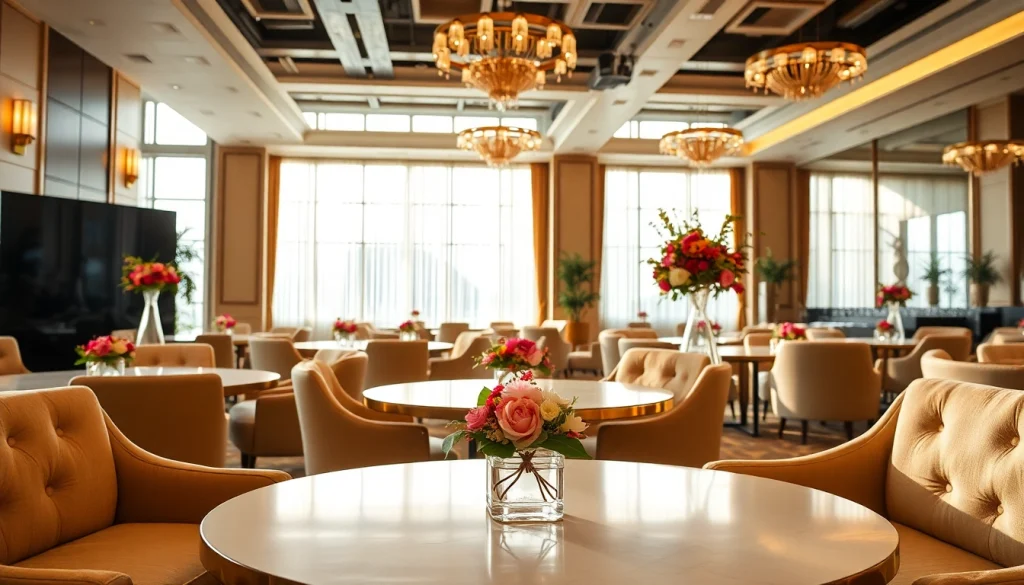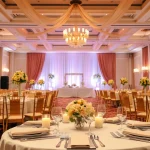Understanding the Importance of Selecting the Right Event Space
Choosing the perfect event space is a critical step in the planning of any occasion, whether it be a corporate conference, a wedding, or a small gathering. The right venue not only enhances the aesthetic and ambiance of your event but also significantly influences guest experiences and interactions. Understanding the essence of selecting a suitable space is vital to crafting memorable occasions.
Defining the Purpose of Your Event Space
Before diving into venue options, it’s crucial to understand the purpose of your event. Will it serve as a networking opportunity, a celebration, or an educational seminar? The nature of your gathering will define the attributes you seek in an event space.
For instance, corporate events often require spaces equipped with audiovisual technology and seating arrangements conducive to presentations. In contrast, social gatherings may prioritize ambiance over functionality, with a preference for unique venues that reflect style and creativity. Therefore, establish clear objectives and outcomes for your event as the first step in your venue selection process.
Key Elements to Consider in an Event Space
Several key factors come into play when evaluating potential venues:
- Location: Accessibility is paramount. Choose a venue that is convenient for most attendees, and consider parking availability and public transport options.
- Capacity: Ensure the space can comfortably accommodate your expected number of guests. Not only should it fit attendees, but there should also be room for movement, dining, and activities.
- Ambiance: The atmosphere of a space influences guest moods. Whether it’s a modern, chic venue or a rustic barn, select a location that aligns with the theme and tone of your event.
- Facilities: Evaluate the amenities offered—restrooms, catering options, wifi access, and audiovisual capabilities are essential to consider.
- Flexibility: Some events may require specific layouts (theater, banquet, or classroom style). Confirm that the venue can adapt to your needs.
Common Pitfalls in Event Space Selection
Despite thorough planning, it’s easy to falter during venue selection. Common pitfalls include:
- Underestimating space requirements—always consider both seating and standing room.
- Ignoring hidden costs such as service fees or overtime charges.
- Failing to visit the venue in person prior to the event to assess traffic flow and the overall ambiance.
- Not checking for availability on pivotal dates well in advance.
- Overlooking the venue’s restrictions, such as noise ordinances and decor limitations.
Types of Event Spaces Available
Uniqueness of Outdoor vs. Indoor Event Spaces
When determining your perfect venue, consider whether an indoor or outdoor setting would better suit your event. Outdoor venues often capture the beauty of natural surroundings, which can be breathtaking for weddings or summer gatherings. However, they may come with challenges, such as weather unpredictability and a need for additional facilities (tents, heating, etc.).
Conversely, indoor venues offer climate control and reliable hotel-style services, making them ideal for more formal events or situations where guest comfort is paramount. Incorporating outdoor space can provide a refreshing balance, allowing for both indoor activities and outdoor mingling.
Cultural Venues and Their Benefits as Event Spaces
Choosing a cultural venue can add an extraordinary element to your event. Museums, galleries, and historic landmarks not only serve as stunning backdrops but also enhance the thematic experience. Such spaces often bring their own creative energy and decor, reducing the need for added embellishments.
Cultural venues tend to facilitate specific events such as art shows, fundraisers, or community events, allowing attendees to engage with cultural artifacts and rich histories. Select a venue that reflects your event’s purpose or theme to enhance the guest experience.
Corporate vs. Private Event Spaces: What to Know
Understanding the differences between corporate and private event spaces helps streamline your search. Corporate venues are typically more utilitarian, focusing heavily on function—think boardrooms equipped with video conferencing tools or auditoriums designed for presentations.
On the other hand, private spaces can offer a personal touch, emphasizing aesthetics and comfort. They can be more varied in style, ranging from elegant ballrooms to cozy homes. No matter the venue type, prioritize the atmosphere that matches your audience and objectives.
How to Evaluate an Event Space
Assessing Capacity and Layout of an Event Space
Evaluating the capacity of an event space should be one of the first steps in your planning process. Request diagrams, floor plans, or even walk-throughs to visualize how attendees will interact within the space.
Consider the layout options that best fit your event’s activities. For instance, if it’s a networking event, an open layout encourages interactions and ease of movement, while a banquet might require more structured seating arrangements.
Accessibility Features in an Event Space
Accessibility is an essential factor in the selection of an event venue. Ensure the space accommodates all individuals, including those with disabilities. Features to look for include:
- Wheelchair ramps to entrances and stages
- Accessible restrooms near event areas
- Sound enhancements for guests with hearing impairments
- Seating arrangements that allow easy access and mobility
Consult with the venue regarding their accommodations and ensure they meet all legal requirements as well as recommended best practices.
Technology and Amenities in Modern Event Spaces
Technology is crucial in modern event planning. Assess the technological amenities available in your shortlisted venues:
- Audio-Visual Equipment: Inquire if they have microphones, projectors, screens, and lighting systems readily available.
- Internet Connectivity: Reliable wifi access is a must; it allows guests to engage digitally, share their experience, and increase your event’s visibility on social media.
- Integration with Event Apps: Some spaces offer integrations with event management software to ease registration processes and attendee communication.
These amenities not only elevate the experience for guests but can also make the event execution significantly smoother.
Cost-Effective Strategies for Booking an Event Space
Understanding Pricing Models for Event Spaces
Event space pricing can be complex. Understand the various pricing models available. Fixed rental rates provide a clear upfront cost, while variable pricing may fluctuate based on the date, time of day, or total hours used. Some venues operate on a per-person basis.
Inquire about additional charges, such as setup fees, cleaning costs, or overtime fees. Assessing all potential costs will help maintain your budget and avoid unexpected expenses.
Timing Your Booking for the Best Deals
Timing is everything when it comes to securing a venue. Typically, booking during off-peak seasons can yield more favorable pricing. Consider weekdays versus weekends; venues are often more affordable during weekdays. Last-minute bookings might also provide steep discounts, but they come with the risk of reduced availability.
Plan ahead. Securing your event space months in advance often guarantees the better options at competitive rates, so create your timeline and stick to it!
Negotiating Terms with Event Space Providers
Many venue providers are open to negotiation, particularly if you’re booking on off-peak days or a less popular time. Don’t hesitate to discuss:
- Lowering the rental rate
- Waiving additional fees or add-ons
- Including complimentary services like catering, parking, or decor
Coming prepared with knowledge about comparable venues or offers can strengthen your negotiation position. Make sure both parties feel advantageous in the agreement.
Creating Memorable Events in Your Chosen Event Space
Personalizing the Event Space for Your Guests
Once you’ve selected your event space, it’s time to make it your own. Personalization can significantly enhance guest experience:
Incorporate thoughtful decor elements that reflect the theme of your event. Tailor the space with branded signage, personalized seating arrangements, and thematic decor. Consider interactive elements—like photo booths or unique seating areas—to engage attendees and create lasting memories.
Implementing Effective Layouts and Flow in an Event Space
A well-planned layout can ensure the event flows seamlessly. Consider how guests will interact in the space. Certain layouts encourage movement through mingling areas, while others may direct focus toward a central point, such as a stage.
Evaluate areas for registration, food stations, seating, and entertainment. Thoughtfully curated flow can direct guest journeys in ways that maximize interaction and enjoyment.
Feedback and Improvements After Your Event in the Space
Post-event feedback is invaluable. Gather insights from guests about their experiences regarding the venue, logistics, and overall value. Surveys can be useful here, encouraging honest and straightforward feedback.
Analyze this feedback critically. What worked well? What could have been done better? Document these insights for future events to continuously improve your venue selection process and event planning strategies.
Conclusively, the process of finding and utilizing the right event space is multifaceted but immensely rewarding. By applying these insights, you can ensure a thoughtfully curated experience that resonates with attendees and leaves lasting impressions.



